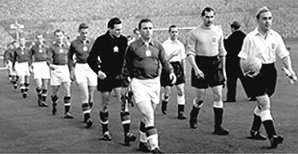Written in 2009 by Emma Anspach, Hilah Almog, and Taylor.
Edited & Updated in 2013 by Brittney Balser and Alessandro Santalbano
***
Authoritarian governments thrive on propaganda. The puppet Hungarian government used the Magical Magyars to promote communism idealism. It is no coincidence that the Magical Magyars utilized teamwork and stressed the importance of every role on the field. The style of play of the Hungarian national team showed an optimal version of communism.
The players on the team had no choice but to be part of the propaganda machine. To be considered amateurs and therefore qualified for Olympic and World Cup play, the players could not be paid as soccer players. Instead, the players were given minister posts in the Hungarian government. While these posts earned the players a salary 5 times the pay of the average Hungarian worker, it was still not a living wage[1].
Many think that the Dutch and Johann Cruyff invented “total football.” In fact, the great Ferenc Puskás helped the Hungarian national team create “total football.” The Hungarian version of total football relied heavily on passing and emphasized teamwork.

http://tim.rawle.org/football/images/puskas1.jpg
Little was expected of the Hungarian national team from outside the country. The other national teams were surprised by the skill of the Hungarians and Hungary shocked the world as they won the Olympic gold medal against Yugoslavia in the 1952 Helsinki games.
Hungary’s new style of play and thrashing of the “inventors” of football in the Match of the Century made them the favorites of the 1954 World Cup in Switzerland. The team had not loss a game in four years. The first two games were easy with Hungary handily beating South Korea and West Germany. Unfortunately, Puskás, the captain, injured his ankle in the West Germany game. Unable to play the next two games, Hungary still made it to the finals, beating Brazil in a ferocious game and later Uruguay in extra time. Although still visibly injured, Puskás decided he was sufficiently recovered to play in the finals. In arguably one of the greatest upsets in World Cup history, West Germany beat Hungary 3-2, coming back from 2-0 deficit and scoring the winning goal with six minutes remaining.
Their international record is remarkable. Incredibly, from 1950 to 1956, Hungary lost once, in the finals of the World Cup. Sadly, because of the Hungarian Revolution, the Magical Magyars did not have the opportunity to pursue the Jules Rimet trophy a second time.
Further Information:
Main Topics:
Football and Politics in Europe
Hitler, Nazi Philosophy and Sport
Sub-Pages:
How to cite this article: “Football and Politics in Europe, 1930s-1950s” Written by Emma Anspach, Hilah Almog, and Taylor (2009), Edited and Updated by Brittney Balser and Alessandro Santalbano (2013), Soccer Politics Pages, Soccer Politics Blog, Duke University, http://sites.duke.edu/wcwp (accessed on (date)).
[1] Meisl, Willy. “The Regulation of Amateurism Is Antisocial.” (1957).
